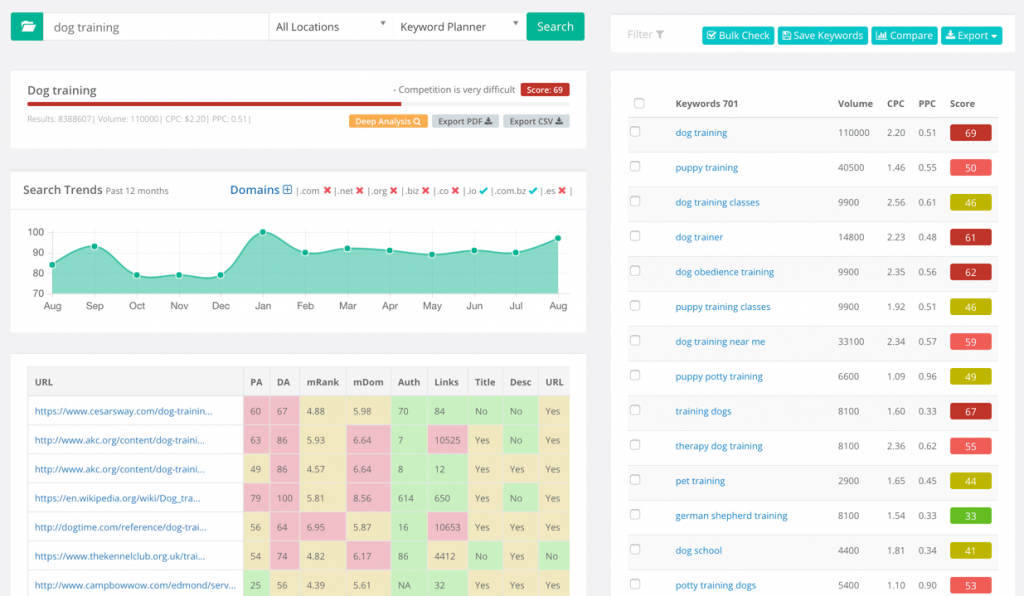Of all the blogging tools that have accelerated my growth, Keysearch is the one that I credit with skyrocketing my traffic and turning me from a hobby blogger to a full-time blogger.
Keysearch is a keyword research and SEO analysis tool that helps you improve your search engine optimisation (SEO) efforts and increase your website’s visibility and traffic.
It includes a variety of keyword research and analysis tools including keyword suggestion, keyword competition, and keyword density, as well as competitor and backlink analysis tools.
The purpose of Keysearch is to help identify the most relevant and profitable keywords for your site and provide you with the insights and data you need to optimise your website and improve your search engine rankings.
It also makes doing keyword research simple and, dare I say it, fun (no really – keyword research is one of my favourite things about blogging).
I’ve been using Keysearch since 2019, and it has helped me grow 3 websites to the kind of traffic levels where I can monetise them with ad networks.
As it is a paid tool, you might be wondering if Keysearch is worth it, and I totally understand the feeling.
In this Keysearch review, I’ll dive into all the benefits of Keysearch, break down the various features of Keysearch, and give you an overview of how to use Keysearch to grow your website and turn your hobby blog into a money-making machine.
Is Keysearch Worth It? An Honest Keysearch Review 2023
What is Keysearch?
Keysearch is a comprehensive keyword analysis tool that offers a wide range of features to help users improve their search engine rankings and drive more traffic to their website.
If you’re totally new to SEO and keyword research, I would recommend reading my review of Nina Clapperton’s SEO Roadmap course first – this course will get you set up for SEO success before investing in a paid keyword research tool!
Some of the key features of Keysearch below, but there are many more features on Keysearch designed to help you grow your website and improve your SEO efforts.
Some of the key features of Keysearch include:
Keyword research
Keysearch provides users with a variety of keyword research tools, such as keyword suggestions, keyword competition, a colour-coded keyword difficulty score, and keyword density.
It also shows the average number of monthly searches for a keyword, which can help identify keywords that are in high demand and which will potentially bring in the most traffic for your website.
The CPC (cost per click) section also provides a general idea of how profitable a keyword could be.
All of this is designed to help you identify the most relevant, profitable, and low competition keywords for your website.
In the screenshot below, we can see that the search volume for the keyword ‘dog training’ is 110000, but the difficulty score is 69, which is very high and will be difficult to rank for.
If you cast your eyes down to the keyword ‘German Shepherd training,’ you will see that although its search volume isn’t as high (8100), it has a difficulty score of 33 (in green), which is much lower and therefore this keyword may be a better one to target.

Competitor analysis
The competitive analysis tool allows you to analyse your competitors’ websites and find out what keywords they are ranking for, which can help you identify opportunities for growth.
Backlink analysis
Keysearch also has a backlink analysis tool that allows you to see which websites are linking to your website and the quality of those links.
If you have spammy websites linking to your site, this could be hurting your relationship with Google and you may want to disavow those links.
Rank tracking
The keyword rank tracking tool allows you to track your website’s rankings for different keywords, which can help you see how your website is performing over time and pinpoint any fluctuations in ranking.
SERP analysis
Keysearch offers a SERP (Search Engine Results Page) analysis tool that allows you to see the titles, meta descriptions and overall appearances of the search results for any given keyword.
Content assistant
Provides a space for you to write your first draft of an article and tracks how many ‘must words’ (words that you should be using to rank) you are using, how close you are to reaching the average word count for that keyword.
Setting up Keysearch
Setting up a Keysearch account is easy.
The only thing you really need to decide on is which pricing plan you want to go with.
There are 4 plans – Starter Monthly, Starter Annual, Pro Monthly, and Pro Annual.
I’ve been on the Starter plan since I joined, and it’s always been more than enough for my needs. In my opinion, the Pro plan isn’t really necessary unless you’re a freelance SEO with a lot of clients.
I also always pay annually as it works out cheaper, but if you don’t want to commit to a year, you can opt for monthly payments.
The Annual Starter plan costs $169 for the full year, or you can use the code KSDISC at checkout for a 20% discount, making it $135.20.
All you have to is the following:
- Go to the Keysearch website and click on the ‘Get Started Now’ button.
- Select the pricing plan that best suits your needs and click on the ‘Sign Up’ button.
- Fill out the registration form. You can use the Keysearch discount code KSDISC for a 20% discount.
- Once you’ve paid and verified your email address, you will be taken to the Keysearch dashboard.
- To start using Keysearch, you will need to add a website to your account. To do this, click on the ‘Add Website’ button in the top right corner of the dashboard and enter the URL of your site.
- Et voila! You’re ready to start optimising your website!
read: travel blog prosperity review
Using Keysearch for keyword research
The main feature of Keysearch is its keyword research tool, which can help you identify the best keywords for your blog.
Here are just some of the things that the Keysearch keyword research tool can do:
- Keyword suggestion: Generates a list of related keywords based on a seed keyword. This is a great way to find new keywords that you may not have considered before.
- Keyword competition: Analyses the competition level for a keyword by looking at the number of websites already ranking for that keyword and the quality of those websites. This can help you determine which keywords are easy to rank for and which you may want to save until your website has more authority.
- Keyword density: Analyses the content of a webpage in the SERPs and shows the density of a keyword on that page. This can help identify keywords that a webpage is already optimised for, and to find opportunities for further optimisation.
- Keyword difficulty: Analyses the competition level for a keyword by looking at the number of backlinks and the strength of those backlinks pointing to the top ranking pages for that keyword. This should also be a deciding factor as to whether you target a certain keyword or not.
- Search volume: Shows the number of monthly searches for a keyword, which can help identify keywords that are in high demand.
- CPC: Cost per click, which can give a general idea about how profitable a keyword can be.
- SERP analysis: Shows the top ranking pages for a keyword, and it also allows you to see the metrics of those pages such as Domain Authority, Page Authority, backlinks and more.
How to use Keysearch to find the perfect keyword
To use the keyword research tools in Keysearch to find relevant keywords, you can follow these steps:
- Log in to your Keysearch account and navigate to the ‘Keyword Research’ section of the ‘keyword Research’ tab on the dashboard.
- Enter a seed keyword into the search bar and click ‘Search.’ The tool will generate a list of related keywords based on the seed keyword. To the left of the keyword suggestions you will see metrics including monthly search volume, CPC, and the difficulty rating that Keysearch has assigned the keyword. The lower the difficulty rating, the easier the keyword will be to rank for.
- Scroll down to ‘SERP Analysis’ and you will see the results of the first page of Google for your keyword. Here, you can see which websites are ranking, the Domain Authority of those websites, how many backlinks they have, and whether they have used the keyword in the URL.
- Click on the ‘Rankings/Traffic’ tab to see what other keywords these URLs are ranking for and an estimate of the traffic they receive.
- Click on ‘Social’ to see how many times the page has been shared on Facebook and Pinterest. This can give an indication of how likely the topic is to go viral.
- Scroll down to the bottom of the page for additional keyword suggestions.
Once you have used these tools to find relevant keywords, you can use the data provided by Keysearch to optimise your post and improve your search engine rankings.
read: the benefits of hiring a virtual assistant for your blog
Using Keysearch for competitor analysis
One of the best things about Keysearch is that it can be used to analyse your competitors’ websites in order to ‘borrow’ their keywords and create your own content using that ranks using those keywords.
Here are some competitor analysis tips for Keysearch:
- Competitor keywords: Keysearch allows you to see what keywords your competitors are ranking for, so you can identify opportunities to target similar keywords on your own website. This can help you to identify new keywords that you may not have considered before.
- Analyse competitor’s backlinks: You can use the backlink checker to analyse the backlinks of your competitors’ websites, which can help you to identify the websites and link building strategies that are working well for them. This can help you to replicate their success and improve your own search engine rankings.
- Analyse competitor’s rankings: By using Keysearch rank tracking, you can monitor your competitor’s rankings over time, and see how their optimisation efforts are impacting their search engine performance.
- Analyse competitor’s on-page optimisation: Using the SERP analysis tool, you can see how your competitors are optimising their website’s content, meta tags, and structure, and use this information to improve your own on-page optimisation.
- Analyse the overall strength of a competitor’s website: Keysearch offers a feature to check the domain authority (DA) and page authority (PA) of a website, which can give you an idea of the overall strength of a website. This can help you to see how much effort you will need to put in order to rank higher than a specific competitor. You can find these metrics on Moz as well, but it’s pretty handy to have it right there in one place.
How to use Keysearch for competitor analysis
To use the competitor analysis tools in Keysearch, you can follow these steps:
- Log in to your Keysearch account and navigate to the ‘Competitive Analysis’ tab on the dashboard.
- In this tab, you will see several options for competitor analysis, such as ‘Backlink Checker,’ Organic Keywords,’ Competitor Gap,’ ‘URL Metrics,’ and ‘Page Analyser.’
- To use these tools, simply enter the URL of a competitor’s website into the search bar and click ‘Search.’ The tool will generate the information you’re looking for, from keywords that the website is ranking for, to backlinks pointing to their website.
With the information provided by these tools, you can see the keywords your competitors are ranking for, the backlinks they have, their website’s metrics and overall strength.
By understanding this data, you can identify opportunities for growth and improve your own optimisation efforts to outrank them.

Benefits of Keysearch
There are so many benefits of Keysearch.
Putting it very simply, Keysearch can help you nail your SEO game, leading to more traffic, and ultimately, more money.
Here are some specific benefits of Keysearch:
- Improved search engine rankings: By using Keysearch to identify relevant and profitable keywords, analyse your competitors, and improve backlinks, you can improve their search engine rankings and drive more traffic to your website.
- Competitive advantage: By using Keysearch to analyse competitors’ websites, you can gain a better understanding of your target audience and identify opportunities for the growth of your own site.
- More efficient link building: By using Keysearch to analyse a website’s backlinks, you can identify opportunities to build more high-quality backlinks to your blog.
- Better understanding of your audience: By using Keysearch to identify relevant keywords, you can gain a better understanding of your target audience and create content that is more likely to be shared and linked to.
- Time-saving: Save time by using features such as the content assistant or competitor analysis tool to mine the keywords of your competitors.
- Cost-effective: Keysearch offers a variety of pricing plans and is by far the most affordable keyword research tool on the market (and way cheaper than Ahrefs!)
Negatives of Keysearch
No Keysearch review would be complete without looking at both sides of the coin and highlighting some of Keysearch’s limitations.
Nothing is perfect, and while I love Keysearch, there are certainly areas that could be improved.
Some of the things that I dislike about Keysearch are:
- Limited data on some of the features: Some users have reported that the data provided by Keysearch is limited on certain features, such as the backlink analysis tool.
- Search volume data is an estimate: The search volume data provided by Keysearch is an estimate and not an exact number. Some keywords will appear to have a search volume of zero, when in actuality, people are searching for that keyword.
- Not all features are available for all countries and languages, and the search volume data can be limited for some geographical locations.
- Dependent on third-party data sources: Keysearch’s data is based on third-party sources, which means that it can be affected by the reliability and accuracy of those sources.
Tips and best practices for effective keyword research
Define your target audience
Before using Keysearch, it’s important to have a clear understanding of your goals and target audience.
Knowing what you want to achieve and who you want to reach can help you to identify the most relevant and profitable keywords for your website.
Take advantage of the various features Keysearch has to offer
Keysearch offers a variety of keyword research tools, so it’s important to use them in combination to get the most comprehensive view of your keywords and competition and create the best possible content.
The content assistant tool is a great tool for making sure you’re using all the words and phrases you should be using if you want a chance of getting on the first page of the search results.
Use long-tail keywords
Long-tail keywords are more specific and less competitive than short-tail keywords, and they can help you to reach a more targeted audience.
This is especially good for affiliate/buyer intent keywords.
Analyse your competitors
Use Keysearch’s competitor analysis tool to see what keywords your competitors are ranking for and identify opportunities for growth.
You can save their highest performing articles and keywords they are ranking for and use that as inspiration for your own content.
Use the SERP analysis tool to analyse the top ranking pages for a keyword, and learn from them. See what they are doing right and try to implement it on your own website.
You can also use the backlink analysis tool to see what kind of backlinks your competitors have and try to get links from similar sites, but keep in mind to avoid low-quality links.
Keep track of your rankings
Use Keysearch’s rank tracking tool to monitor your website’s rankings for different keywords over time and see how your optimisation efforts are impacting your search engine performance.
Have patience!
Remember to keep in mind that SEO is a long-term strategy.
Your results might not be immediate and continuous work is needed to maintain and improve your ranking.
You should also remember that analysing your competitors is a continuous process, and you should check them regularly to see if they are improving their SEO and adjust your strategy accordingly.
Keysearch Review | Final Thoughts
Keysearch offers a comprehensive set of tools that can help you improve your search rankings, drive more traffic to your website, and gain a competitive advantage in your niche.
Its user-friendly interface and wide range of features make it accessible to anyone, from beginners to seasoned professionals.
With that being said, it’s important to keep in mind that like any tool, Keysearch has its limitations, and the data it provides is not always 100% accurate.
Overall, my view is that Keysearch can be a valuable resource for SEO and keyword research, and my sites would not be where they are right now without it.
You do need some knowledge of SEO before using Keysearch, but when used correctly, it’s a vital tool for your blog.
I hope that this Keysearch review has been helpful and cleared up any questions you may have.
If there’s anything I didn’t mention, do feel free to reach out and let me know in the comments section below and I will get back to you.
To download Keysearch and get started today, just click this link and be sure to use the code KSDISC for 20% off.
Until next time,
XOXO






[…] per month), while I use Keysearch, which is equally fantastic and costs just $17 per month (you can read my Keysearch review here).The reason they do this is because they make a commission if you sign up to the products they […]